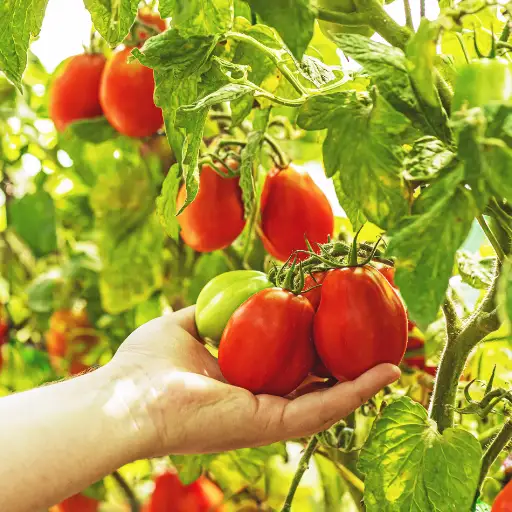Tomatoes are among the most rewarding crops to grow, but they demand the right nutrients to thrive and consistently produce juicy, flavorful fruits. Organic liquid fertilizers have emerged as an ideal solution for providing the essential nutrients tomatoes need while minimizing environmental impact and adhering to sustainable gardening practices. This article explores the best organic liquid fertilizers specifically designed for tomato plants, offering practical insights to help your garden flourish. Whether you’re a seasoned gardener or a beginner looking to grow healthier plants, you’ll discover effective, eco-friendly solutions to enhance your tomato harvest naturally.
Understanding Tomato Nutrition
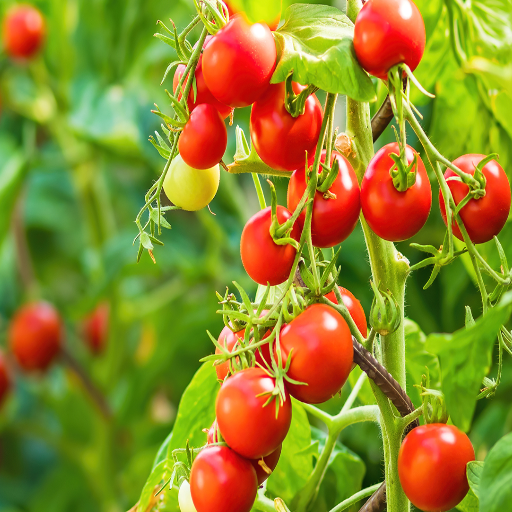
The Role of Nutrients in Tomato Growth
For tomatoes, it is very important that a balanced range of macro- and micronutrients be available in the soil so that the plant grows healthy leaves, develops beautiful flowers, and finally produces tasty fruits. Each nutrient has an important and specific role to perform at each stage of the plant’s growth, starting from root initiation to fruit ripening. The table below lists all essential nutrients required for the healthy growth of tomato plants and their functions:
- Nitrogen (N): Nitrogen is the primary macronutrient promoting vigorous vegetative growth and luscious foliage. Tomatoes require ample nitrogen in the early stages of growth. However, excess nitrogen causes plants to grow tall and leafy at the expense of fruiting.
- Phosphorus (P): Phosphorus is involved in energy transfer in the plant. It is very important for root development, flower formation, and fruit set. A phosphorus deficiency restricts plant growth and leads to poor fruit production, especially in cold soils.
- Potassium (K): Potassium imparts vigor to the plant while playing a great deal in the improvement of fruit size, flavor, and resistance to diseases. In addition to that, potassium supports water regulation since it maintains a healthy water balance inside the plant and increases its tolerance to adverse conditions, such as drought and extreme temperatures.
- Calcium (Ca): Calcium is needed for the cell wall structure and prevents various physiological disorders, such as blossom-end rot in tomatoes. Ca deficiency usually occurs under conditions of irregular watering or when grown in acid soils.
- Magnesium (Mg): Magnesium forms part of chlorophyll, which gives tomato plants their green color and undertakes photosynthesis. A deficiency in magnesium causes interveinal chlorosis: there is yellowing of the leaves between veins, especially in the older leaves.
It is essential to maintain an optimum balance of these nutrients in the soil when amending with fertilizers or compost to maintain the utmost health and productivity of the tomato plants. Also, by regularly testing soil nutrient levels, one can pinpoint particular deficiencies and supplement them accordingly for their plants.
Importance of Nitrogen, Phosphorus, and Potassium
The three major macronutrients that are essential for plant growth and development include nitrogen, phosphorus, and potassium (commonly abbreviated as NPK). Nitrogen is important for the formation of chlorophyll, which is the substance in green leaves that makes photosynthesis possible. It also helps in the growth of the foliage, thus very important for leafy plants. Some plants with nitrogen deficiency show stunted growth, pale discoloration, or yellowing of leaves due to inadequate chlorophyll formation.
Phosphorus functions in energy transfer within the plant, especially in the synthesis of adenosine triphosphate (ATP). The nutrient is required for the development of roots, flowers, and fruits in plants. Plants generally develop feeble root systems, late maturity, and dark or purplish discoloration in the leaves under phosphorus deficiency while struggling to metabolize energy efficiently.
Potassium is vital for all internal life processes in a plant, from water movement to the activation of enzymes to the fight against diseases. It keeps cell walls strong, favors drought resistance, and is paramount for having fruit with good quality and a reasonably good yield. Deficiency symptoms usually appear with browning or scorching at the leaf edges, weak stem, and diminished stress resistance and pathogen attack, thus compromising plant vigor and productivity.
An optimal state of nitrogen, phosphorus, and potassium is necessary for good plant health. One should now and then assess the soil conditions and apply fertilizers that cater to the NPK needs of the crop for nice growth and full yield. Proper application of nutrients averts any deficiency and potential over-fertilization, which will only be detrimental to the plant and the environment.
Organic vs. Synthetic Fertilizers for Tomatoes
In the view of many, organic fertilizers are natural, slow-release types, and environmental-friendly, whereas synthetic types are fast-acting, cheap, but may be detrimental to soil health in the long run.
|
Aspect |
Organic |
Synthetic |
|---|---|---|
|
Origin |
Natural sources |
Chemical origin |
|
Action |
Gradual effect |
Instant effect |
|
Expense |
Higher cost |
Lower cost |
|
Soil Health |
Improves soil |
Depletes soil |
|
Eco-Impact |
Environmentally safe |
Less eco-friendly |
|
Retention |
Low nutrient loss |
High nutrient loss |
|
Usage |
Long-term focus |
Short-term fix |
Benefits of Using Organic Liquid Fertilizer
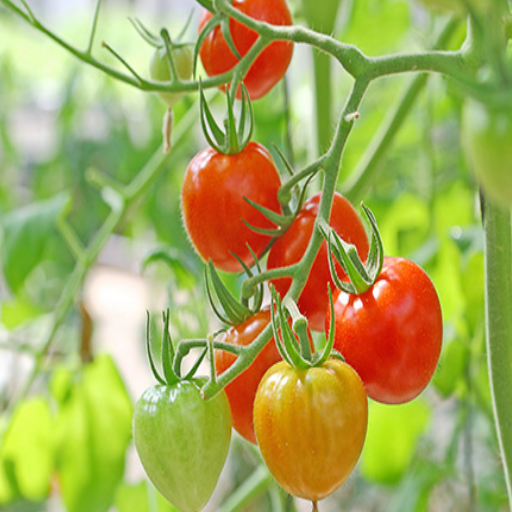
Improved Plant Health and Yield
Organic liquid fertilizer application plays an utmost role in improving the general health of plants and increasing agricultural yields. Being of natural origin, such fertilizers are considered superior since the essential macro- and micronutrients-N-Nitrogen, P-Phosphorus, and K-Potassium supplied in their bioavailable form, which plant roots readily absorb. However, beyond providing nutrients, organic fertilizers also contain beneficial organisms such as mycorrhizal fungi and nitrogen-fixing bacteria. These organisms enter into symbiotic associations with plant roots, thereby enabling them to take up nutrients more efficiently and increasing plant resistance against pathogens.
Research confirms the guaranteed better root system, robust stem growth, and higher chlorophyll content with the constant application of organic liquid fertilizers, all of which are contributing factors toward better photosynthetic activity. There are studies further confirming that the crops treated with an organic liquid fertilizer have shown up to a 25% increase in yield versus the conventional fertilizers, especially vegetables and fruits. These fertilizers improve soil texture and structure in due course as they add humic matter and other organic matter, thereby providing a soil environment ideal for root proliferation.
Another factor that critically determines the effectiveness of these fertilizers is their environmental impact. Synthetic fertilizers usually cause leaching of nutrients, eutrophication of water bodies, etc. Therefore, liquid organic fertilizers slow down the release of nutrients for the plant’s sustained growth. This nature of being eco-friendly is in accordance with the ideals of sustainable agriculture and reducing carbon footprints. Organic liquid fertilizers not only increase crop output but also uphold the long-term health of soil and the environment. Thus, they are an indispensable tool in any sustainable farming system of the future.
Enhancing Soil Quality with Organic Practices
One of the best ways to sustainably increase the productivity of various crops is to improve soil quality. Organic practices emphasize rebuilding and sustaining soil health through natural means. Substances said to enhance organic carbon levels in soils include organic matter, compost, cover crops, and animal manure. These substances create ideal conditions where microorganisms proliferate, interacting with various key factors to cycle nutrients and maintain soil structure. Moreover, this approach to organic fertilizer reduces the dependence on chemical one that harm soil life and cause fertility problems later on.
Among the primary benefits that organic practices bring are soil texture modification and water retention. Organic matter produces soil aggregates that enhance porosity, thereby facilitating aeration of the soil. Consequently, such soils can absorb more water and retain it for more extended periods ,process minimizes soil erosion parallel to leaching of nutrients. Studies have revealed that soils managed with organic processes hold greater water when compared with soils relying on synthetic inputs. It means the actual performance-mouth-watering in drought or inconsistent rainfall-may take its toll in moisture availability for crop growing.
Organic soil management also aids in the sequestration of atmospheric carbon, thereby contributing to climate change mitigation. Another type of practice complementary to organic amendments is conservation tillage, such as no-till or low-till systems. These systems encourage the retention of stored carbon in the soil, thus reducing greenhouse gas emissions and enhancing the soil structure. Also, long-term studies show that these organic systems usually provide greater microbial diversity and disease suppression than the conventional ones, resulting in agricultural ecosystems that are more resilient. Thus, with organic methods, farmers can work toward sustainable agriculture that is both productive and environmentally accountable.
Environmental Benefits of Organic Fertilizers
In my point of view, the supply of environmental goods by organic fertilizers extends with the enhancement of soil formation-i.e., they are essentially building blocks for the sustainable agricultural product. It attempts to fix the ecological balance by replenishing the soil with nutrients and minimizing the use of chemicals, which are generally related to pollution and soil degradation. Organic fertilizers from compost, manure, plant residues, etc., mimic nature’s action of nutrient cycling and help a healthier soil ecology.
Another key advantage is the reduction of greenhouse gas emissions. Synthetic fertilizers, by their energy-intensive manufacturing processes, may produce substantial quantities of nitrous oxide, which is a powerful greenhouse gas, whereas organic fertilizers usually put out nutrients very slowly, thus lessening cases of leaching and runoff into waterways that can cause eutrophication. By utilizing organic inputs, farmers lower the carbon footprint of agriculture, fighting to an extent against climate change.
Besides, organic fertilizers nurture beneficial microorganisms, which notably augment soil structure and fertility. Water retention and aeration improve for these microorganisms, whereas these may also resist soil pathogens, thereby lessening the usage of chemical pesticides. Hence, the organic fertilizers become an all-encompassing approach for farming that inculcates environmental consciousness and undergirds long-term productivity, thus setting agriculture on a course sympathetic with the ecological well-being.
How to Apply Organic Liquid Fertilizer
Step-by-Step Guide to Fertilization
- Prepare the Fertilizer Solution: Dilute the liquid organic fertilizer according to the application rate set by the manufacturer. The concentration can be varied with the type of plants, soil conditions, or growth stage. An example of dilution that is usually applied is the 1:10 ratio of fertilizer to water.
- Conduct a Soil Test: Check nutrient deficiency and pH of the soil before application. Such information will help optimize the fertilization in such a way that the nutrients supplied match exactly with what the soil and plants require.
- Apply During Optimal Conditions: Late afternoons or early in the morning make the perfect time to apply fertilization treatments by ensuring minimal interference from afternoon hot sun rays. If the sun is too hot, that means high heat, which can cause evaporation, thereby interfering with processes at work and reducing products’ efficiency due to that aspect. Avoid any unfavorable weather: that is for wind will drift fertilizers away from the desired target, and rainfall will leach nutrients away.
- Uniformly Distribute Fertilizer: The fertilizer should be sprayed evenly onto the soil surface or through foliar feeding onto the foliage. Foliar application has the advantage of being the fastest-growing uptake during stress or nutrient deficiency by plants.
- Monitoring Application Rates: An exact measure of application rate must be followed to avoid fertilizer overload and contamination process by nutrients running away into the environment. For example, leafy vegetables require lighter and frequent applications, while fruiting plants require heavy applications directed toward essential macronutrients during major growth phases.
- Maintenance after Application: After applying the fertilizer, water the area thoroughly, except if applying foliar fertilizers. This promotes entry of nutrients into the soil and facilitates their movement into the root zone. For foliar fertilizers, it is harmful to leave traces of fertilizer on the leaves because these may cause leaf burns when exposed to the sun.
- Keep Assessing Plant Response Regularly: Plants should be observed for health and growth regularly after fertilization to determine whether the fertilization had any apparent effect. Look for aspects such as improved vigor or color or even fruit production. These observations will help hurdle any implications for the fertilization schedule so that a more consistent result is obtained.
Following these steps helps the farmer or gardener get the most from his/her organic liquid fertilizers to nurture plants through a concern for sustainability and nutrient efficiency.
Timing and Frequency for Feeding Tomato Plants
Feeding tomato plants at an optimal time and a precise frequency is critical for potential yield and robust crop health. In the first phase of growth, tomato plants derive their optimal nutrition from the first feed at transplanting time. This will ensure that the young plants establish firm roots and adapt well to the new environment. A balanced application of an organic liquid fertilizer high in nitrogen is mostly recommended at this time.
Fertilization must now be biweekly once plants enter the vegetative phase of growth, usually 2 to 3 weeks after planting. This period requires nutrients like phosphorus and potassium to develop stem strength and leaf expansion. During flowering and fruiting stages, the frequency-wise, slight increases in feeding amounts must be applied in smaller volumes more often, weekly, focusing on potassium for bearing and quality of fruits. An important thing to remember is to apply feeding during the cooler part of the day, so as not to promote rapid leaching of nutrients, or better still, during the early morning or evening hours when evaporation is minimal.
Regular testing of soil nutrient levels and monitoring of the plant’s condition is essential to fine-tune feeding schedules. Using slow-release formulations along with liquid feed can enable a smoother nutrient supply, thereby avoiding sharp growth fluctuations or nutrient deficiencies as the tomato plant matures.
Side Dressing Techniques for Optimal Growth
Side dressing is a critical technique used to supplement nutrient availability during the active stage of plant growth to ensure good plant development and maximum yield. Fertilizer application is made to the soil adjacent to the plant root zone, from where its immediate absorption occurs. Timing, fertilizer type, and application method are the decisive factors for an effective side-dressing operation.
Side dressing should be performed during the critical period of nutrient demand for optimum growth. For most crops, including tomatoes, side dressing is performed during phases of flowering and fruit set when plants require additional nutrients. Nitrogenous fertilizers are often used at this stage for the vigorous growth of plants, but balanced fertilizers with potassium and phosphorus also help in flowering and fruiting.
Modern application methods ensure that nutrients are efficiently utilized while preventing their wastage. Direct injection of liquid fertilizers through drip irrigation systems will allow even more precision in nutrient application. It has been reported that through fertigation, the efficiency of nutrient uptake can be improved as much as 40% in comparison with traditional broad-spectrum methods.
An extra value shall be added by merging this method with soil moisture monitoring, to ensure nutrients are kept bioavailable without excessive leaching. Following this concept, other modern applications of controlled-release fertilizers or biostimulants can also be incorporated, thereby improving nutrient delivery and lessening environmental impact. Side dressing with these considerations in place can really help to improve crop performance and overall productivity.
DIY Organic Liquid Fertilizer Recipes
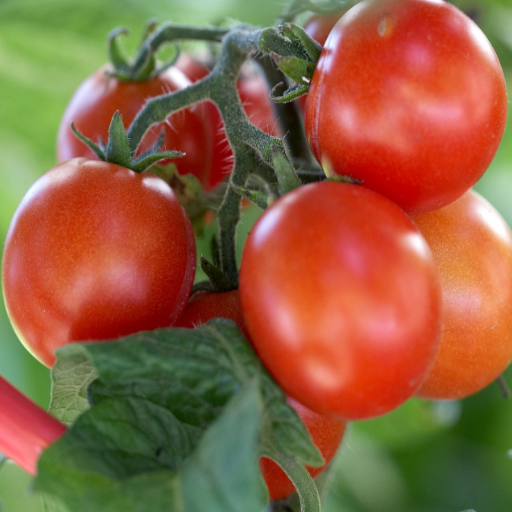
Using Manure and Seaweed Extract
Manure and seaweed extract make a potent combination of solutions for enhancing plant growth and the health of a particular soil. Manure is rich in nitrogen, phosphorus, and potassium, which are macronutrients that improve soil structure and increase organic matter content. Conversely, seaweed extract provides micronutrients such as magnesium, zinc, and iron, as well as natural growth promoters like cytokinins and auxins that enhance root formation and plant vigor.
For the preparation, manure must first undergo complete composting so as to eliminate pathogens and render nutrients bioavailable. After which, one part of composted manure should be mixed with five parts water and allowed to steep for about 24-36 hours. Then, add about five percent volume of liquid seaweed extract into the mixture. This process preserves the even distribution of nutrients from both sources for increased uptake efficiency.
The efficacy of this blend is mentioned by stating that mixed application of organic amendments could increase not only yield but also soil microbial diversity. Liquid fertilizer application kept at an interval of two to three weeks during the active growing season would best optimize nutrient delivery and reduce the chemical inputs. Always strain it out, lest sprinkle tools or irrigation channels might get clogged up.
Cost-Effectiveness of Homemade Fertilizers
Certainly, it would score heavily for cheap-way fertilizers for both small growers and large plants. Through the use of organic materials such as kitchen garbage, lawn clippings, or animal manure, which are readily at one’s disposal, producers will be able to cut down on the use of commercial fertilizers, which usually are heavy in terms of production costs and transporting expenses. As recent agricultural investigations reveal, depending upon whether or not the materials are locally sourced and the methods of processing, production costs of homemade fertilizers may be 50-75% lower than the synthetic alternatives.
Furthermore, incorporation of organic amendments leads to dual benefits- one enhancing soil health through microbial activity and the other lessening environmental sustainability by way of lesser chemical runoff and energy consumption in production. A comparison of yield results reveals that when continuous application at appropriate time intervals is employed, homemade fertilizers can produce near equal crop yields, and in some cases, even superior to those produced by synthetic fertilizers over time. This supports that the use of homemade fertilizers is a sustainable and economically viable strategy for long-term agricultural productivity.
Moreover, being scalable and adaptable, homemade fertilizers prove to be very flexible for varying agricultural needs. By adjusting the nutrient type corresponding to a crop type or soil deficiency, farmers or gardeners would customize their inputs without bearing much cost. This ability can especially solve some local nutrient demand while still keeping down on the expenses.
Comparing Organic and Synthetic Fertilizers
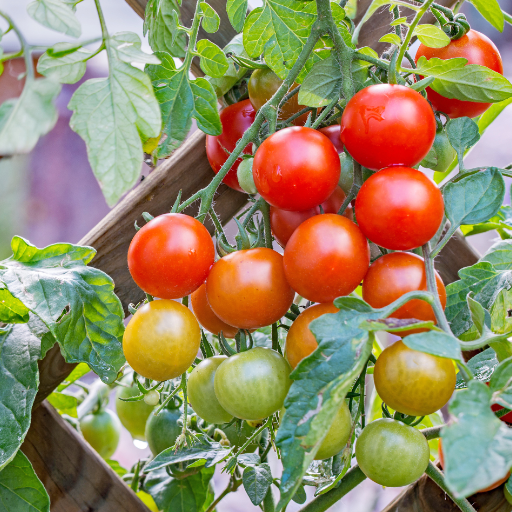
Advantages of Organic Fertilizers for Flowering Tomatoes
- Improved Soil Structure: Organic fertilizers improve soil structure by increasing the humus content in the soil, which allows for better aeration, water retention, and root penetration, thus providing an ideal environment for the blooming tomato plants. Studies show soils enriched with organic matter increase water-holding capacity by about 25% on average, more than synthetic fertilizers.
- Sustainable Nutrient Supply: Nutrient leaching usually occurs under the application of synthetic fertilizers, while organic fertilizers are slow in nutrient release. That kind of slow release corresponds with the growth stages of flowering tomatoes, providing continuous nutrition to the fertilizers at all times. Studies have shown that the use of organic fertilizers can bring down nutrient runoff by more than 50 percent, which is a great advantage toward fertility in the long term.
- Enhanced Microbial Activity: Organic fertilizers also stimulate the growth of beneficial microbes found in the soil. Microorganisms perform a critical function in decomposing organic matter, hence enabling nutrient availability for the tomatoes. For example, rhizobacteria in organically rich soils can enhance nutrient uptake efficiency by up to 30%.
- Reduction in Chemical Residues: Tomatoes grown with organic fertilizers do not contain residual chemicals that would constitute a hazard to health. This is more so for flowering tomatoes that are used in fresh salads or processed products. Studies have shown pesticide residues can be reduced by 80% in produce thanks to the organic method of farming, allowing for safer consumption.
- Environmental Benefits: Organic fertilizers are made from renewable resources and, thus, they help reduce environmental footprints. In organic farming, organic wastes are recycled into compost or manure, reducing reliance on chemical inputs.
Therefore, these combined benefits prove that organic fertilizing methods support sustainable, high-yield production of flowering tomatoes.
Disadvantages and Limitations of Synthetic Fertilizers
They do have several disadvantages and limitations, making their use less favorable in agriculture today. The following five major problems are associated with them:
- Environmental Pollution: Synthetic fertilizers cause soil pollution and water pollution. Often they leach excessive nutrients, particularly nitrogen and phosphorus, into water bodies, leading to eutrophication. In brief, eutrophication causes algal blooms, oxygen depletion, and harm to aquatic ecosystems.
- Decline in Soil Fertility: Long-term use may lead to alterations in soil and a reduction in organic matter through various mechanisms. Soils get compacted over time, preventing water and nutrients from building up; in such a situation, growers have to apply synthetic fertilizers in greater doses to maintain the yield value. It has been studied that high synthetic input dependent soils may lose almost 50% of their original carbon content over several decades.
- Greenhouse Gas Emission: Synthetic fertilizers are one of the greenhouse gas emissions during production and use. The manufacturing of nitrogen fertilizers releases nitrous oxide (N₂O), a greenhouse gas 300 times more potent than carbon dioxide (CO₂). It is estimable that the synthetic fertilizer manufacturing contributes about 2 to 3 percent of global greenhouse gas emissions every year.
- Cost and Dependency on Resources: Synthetic fertilizers are high-priced, as their synthesis involves energy-intensive processes, such as the Haber-Bosch process for ammonia synthesis. Also, their manufacture depends on non-renewable inputs such as natural gas and phosphate rock. Farmers at the small scale cannot afford synthetic fertilizers, whose prices also undergo fluctuations in the global markets.
- Health Risks from Chemical Residues: Application of dosage of synthetic fertilizers may result in chemical residues in soil and produce. Runoff from fertilizers and high nitrate levels in drinking water pose serious health risks, especially for infants, who may suffer from methemoglobinemia, also called “blue baby syndrome.” Exposure to certain substances in some synthetic fertilizers has been associated with respiratory and skin diseases in agricultural workers over long periods.
These limitations highlight the urgency to engender sustainable options and balanced fertilization practices to alleviate the negative impacts of synthetic fertilizers.
Making Informed Choices for Your Tomato Garden
When embarking on a tomato garden, one must pay attention to soil composition, nutrient requirements, and environmental factors to guarantee favorable growth and yield. Tomatoes favor loamy soil that is well-drained, with a pH a tad on the acidic-to-neutral side, between 6.0 and 6.8. Assessing nutrient levels (especially nitrogen, phosphorus, and potassium) before planting is critical. These elements bear much significance in the development of tomatoes. Excessive fertilization, especially with nitrogen, can promote lots of leaf growth but no fruit setting-the fertilization needs to be balanced.
Maintaining crop rotations and adding organic matter like compost or well-rotted manure enhances soil structure and health over time. Some studies have shown that companion planting too helps with pest control and pollination enhancement; basil and marigold are commonly planted alongside tomatoes to ward off aphids and nematodes.
Consistent watering further promotes plant health and reduces disease incidence. Drip irrigation is best for this purpose since it keeps the leaves dry and prevents fungal infections. Such practices, when used in conjunction with other sustainable and evidence-based methods, can guarantee a bountiful tomato harvest while keeping the ecological footprint of your garden low.
References
Frequently Asked Questions (FAQ)
Q: What is liquid tomato fertilizer organic?
A: Liquid tomato fertilizer organic is a type of fertilizer specifically formulated for tomato plants, made from natural sources such as kelp and bone meal. It provides essential nutrients in a water-soluble form, allowing for quick absorption by the plants.
Q: How does liquid tomato fertilizer organic benefit my tomato plants?
A: Using liquid organic tomato fertilizer helps boost the growth of your tomato plants by supplying them with a wide range of nutrients. It enhances their ability to produce healthy fruits and lush foliage while ensuring they receive the necessary nutrients for optimal development.
Q: Can I use liquid organic tomato fertilizer for tomatoes in pots?
A: Yes, liquid tomato fertilizer organic is perfect for tomatoes in pots. It provides the right balance of nutrients, ensuring your container-grown tomato plants thrive. Just be sure to use the recommended dilution rates to avoid over-fertilizing.
Q: How often should I feed my tomato plants with liquid fertilizer?
A: It is advisable to feed your tomato plants with liquid fertilizer every two to three weeks during the growing season. This helps maintain a steady supply of nutrients, which is crucial for productive tomato plants and to support new growth.
Q: What should I do before applying liquid organic tomato fertilizer?
A: Before applying liquid organic tomato fertilizer, it’s a good idea to conduct a soil test. This will help you determine the existing nutrient levels and pH, ensuring that your soil is slightly acidic and has the right conditions for growing tomatoes.
Q: Can I mix liquid tomato fertilizer organic with other fertilizers?
A: While you can mix liquid tomato fertilizer organic with other organic fertilizers, it’s important to be cautious. Combining different types may alter the NPK ratio and affect how your plants absorb nutrients. Always check compatibility before mixing.
Q: What are the best organic sources for tomato plant nutrients?
A: Some of the best organic sources for tomato plant nutrients include kelp meal, bone meal, and compost. These ingredients provide a slow release of nutrients, ensuring that your plants receive the nutrients they need over time.
Q: Should I avoid fertilizing my tomato plants during certain times?
A: Yes, it is best to avoid fertilizing your tomato plants when they are stressed, such as during extreme heat or drought. Instead, focus on maintaining moist soil and providing them with compost around the planting hole to help them thrive.
Q: How can I keep my plants healthy with liquid organic tomato fertilizer?
A: To keep your plants healthy, ensure you follow the recommended application rates for liquid organic tomato fertilizer. Additionally, monitor soil moisture levels and provide adequate drainage to prevent root rot while supporting the growth of your tomato plants.



